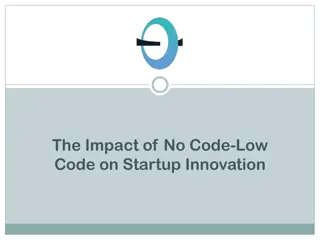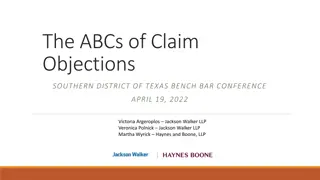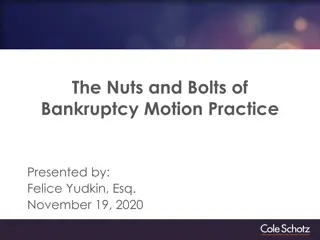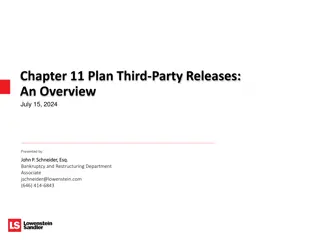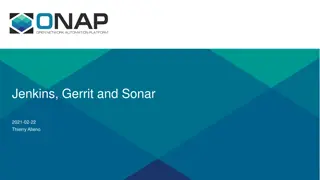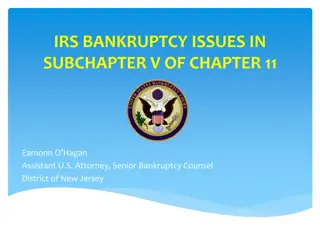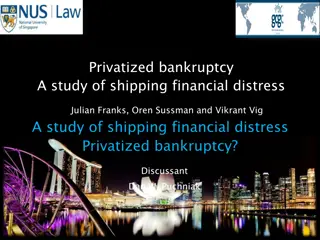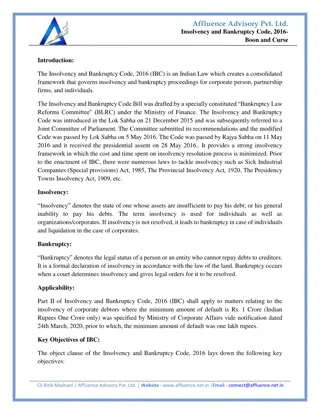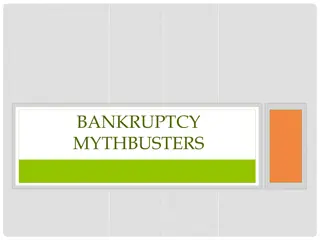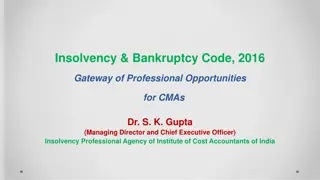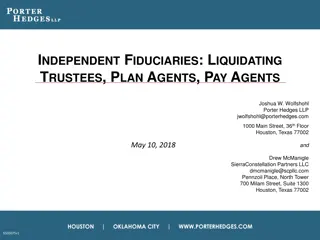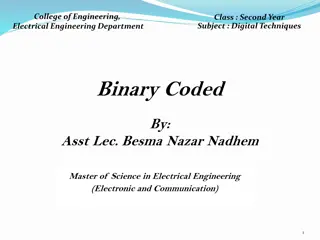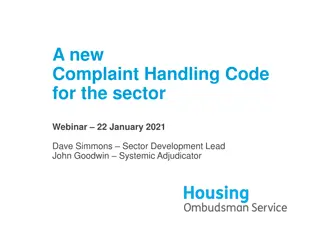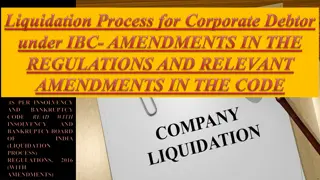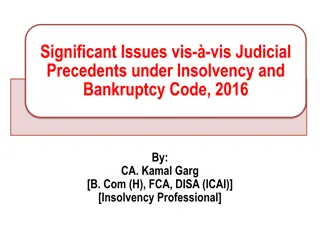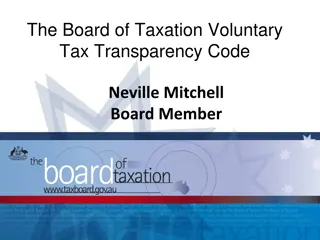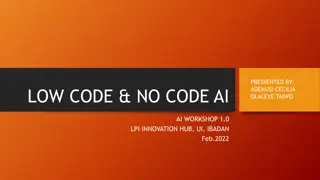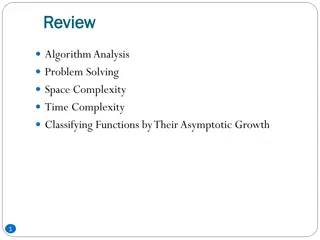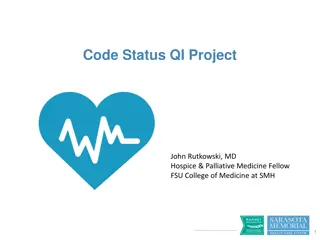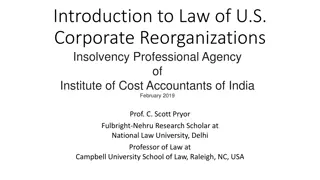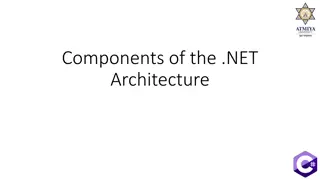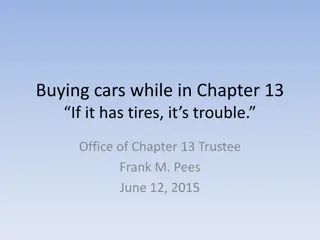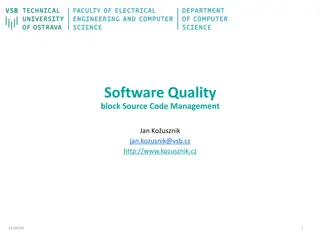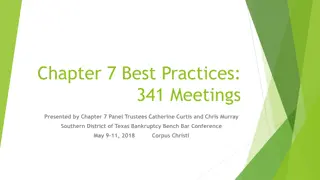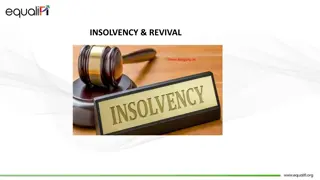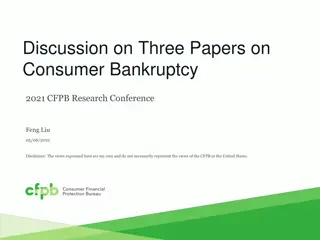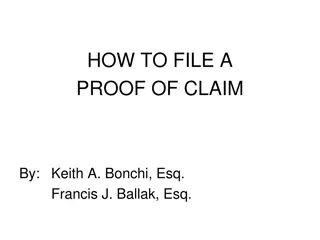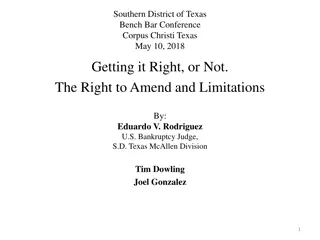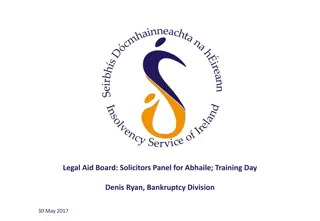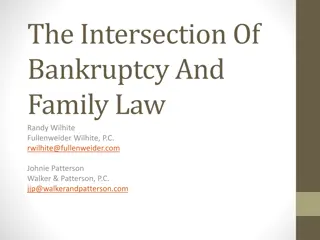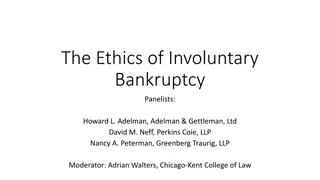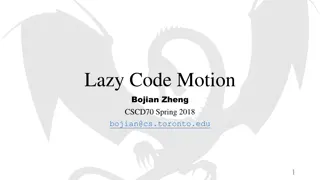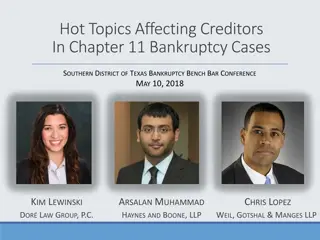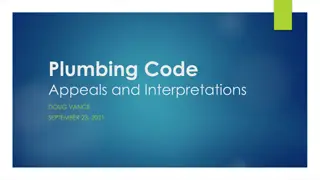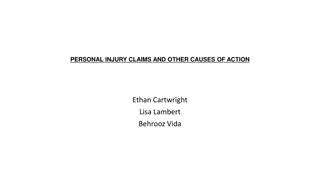The Impact of No Code-Low Code on Startup Innovation
In the vibrant world of startups, innovation is the cornerstone of success. As these businesses aim to carve out their niches, they often face a common hurdle: the extensive resources required for traditional software development. However, the emergence of low code no code (LCNC) platforms is revolu
2 views • 12 slides
Understanding Claim Objections in Bankruptcy Proceedings
Explore the essential aspects of claim objections in bankruptcy proceedings, covering the burden of proof, forms of objections, and necessary elements in support of objections. Learn about the duties of debtors in objecting to improper claims and the importance of proper declaration in claim objecti
1 views • 12 slides
Bankruptcy Motion Practice Essentials
Dive into the key aspects of bankruptcy motion practice, from contested matters to adversary proceedings. Learn about the rules and guidelines, required documents for motions, and best practices for drafting motions in bankruptcy cases.
0 views • 12 slides
Understanding Third-Party Releases in Chapter 11 Bankruptcy Plans
Chapter 11 bankruptcy plans often include provisions for third-party releases, releasing non-debtor entities from claims held by creditors. These releases can impact various stakeholders, from insiders to affiliates, and involve consent through opt-out mechanisms. In the Third Circuit, such releases
3 views • 8 slides
Liquidation of Companies: Procedures as per IBC 2016
The process of liquidating a company involves collecting and selling its assets to pay off debts, with remaining funds distributed to shareholders. Under the Insolvency and Bankruptcy Code (IBC) 2016, specific procedures must be followed, including initiation by either creditors or debtors within se
0 views • 16 slides
Improving Code Analysis Workflow with Jenkins, Sonar, and Gerrit
Enhance code analysis processes by analyzing source code before merging, enabling analysis in branches, and triggering Jenkins jobs. Sonar.cloud provides options to analyze branches using Maven build, while the proposal suggests using Jenkins plugin for code review. Addressing challenges with Gerrit
1 views • 12 slides
IRS Bankruptcy Issues in Subchapter V of Chapter 11 Explained
This content discusses the IRS bankruptcy issues in Subchapter V of Chapter 11, focusing on tax return filing requirements and payment of post-petition taxes under both standard Chapter 11 and Subchapter V. The responsibilities of debtors, trustees, and governmental units, as well as the compliance
2 views • 7 slides
Privatized Bankruptcy in Shipping: Financial Distress Resolution and Industry Comparisons" (75 characters)
This study explores how financial distress in the shipping industry is managed through private institutional arrangements, minimizing economic costs. It compares unique contractual innovations in shipping to traditional corporate bankruptcy processes, highlighting shipping's outlier status and the e
0 views • 18 slides
Insolvency and Bankruptcy Code, 2016- Boon and Curse
The Insolvency and Bankruptcy Code (IBC) 2016 provides a unified framework for resolving insolvency in India, aiming to streamline processes, reduce resolution time, and protect creditors. While it enhances financial stability and transparency, chall
0 views • 4 slides
Debunking Bankruptcy Myths: Consumer Insights & Realities
Consumer bankruptcy is defined in the Bankruptcy Code as debt incurred for personal, family, or household purposes, distinct from business debt. This article debunks common myths surrounding bankruptcy, such as its impact on credit, individuals' financial status, and its role in society and the econ
1 views • 14 slides
Understanding the Insolvency and Bankruptcy Code of 2016 in India
The Insolvency and Bankruptcy Code of 2016 in India replaced various existing laws to streamline the process of corporate restructuring, insolvency, and liquidation. Enacted to resolve bad debts efficiently, attract investors, and strengthen the economy, the code offers benefits like quicker resolut
0 views • 31 slides
Comprehensive Guide to Post-Confirmation Trusts and Plan Agents
Learn about the importance and necessity of post-confirmation trusts and plan agents in bankruptcy cases, the selection process for trustees/fiduciaries, choosing the right post-confirmation vehicle, creating trusts through agreements, and understanding the role of litigation/liquidation trusts in m
0 views • 32 slides
Understanding Binary Coded Decimal (BCD) and Excess-3 Code
Binary Coded Decimal (BCD) is a binary code used to represent decimal numbers, with the popular 8421 BCD code and its conversion process explained. Additionally, Excess-3 Code, another BCD code, is detailed with an example of finding its code for a given decimal number. Different BCD codes like 4221
0 views • 11 slides
A New Complaint Handling Code for the Sector - Webinar Highlights
This webinar discusses the introduction of a new Complaint Handling Code for the sector, aiming to address issues in social housing complaint processes. It covers key points, the background leading to the code's development, the Ombudsman's experience, and the code's aims and framework towards high-
0 views • 14 slides
United States Attorney's Office, Southern District of Texas - Helping with Bankruptcy Matters
The United States Attorney's Office in the Southern District of Texas, led by Civil Chief Daniel Hu and AUSA Rick Kincheloe, assists with bankruptcy matters, representing the government in such cases. They work alongside other components of the U.S. Department of Justice, such as the Tax Division, t
0 views • 34 slides
Liquidation Process and Costs under Insolvency and Bankruptcy Code
The process of passing a liquidation order under the Insolvency and Bankruptcy Code is detailed, including scenarios for passing the order and the steps involved in the liquidation process. The costs associated with liquidation, as defined under Section 5 and Regulation 2(ea), cover various expenses
0 views • 28 slides
Key Judicial Precedents on Insolvency and Bankruptcy Code, 2016
Key judicial precedents under the Insolvency and Bankruptcy Code, 2016 are discussed, including rulings on insolvency pleas, distribution of profits during Corporate Insolvency Resolution Process (CIRP), obligations of unrelated parties, the 90-day period for filing claims, and the interaction of mo
1 views • 21 slides
The Board of Taxation Voluntary Tax Transparency Code Overview
The Board of Taxation developed a voluntary Tax Transparency Code to address community concerns and promote greater tax transparency among large businesses. The Code outlines recommended disclosures for both large and medium businesses, encouraging adoption of higher disclosure standards. Internatio
0 views • 20 slides
Simplifying AI Development with Low-Code and No-Code Platforms
Explore the world of low-code and no-code AI development platforms, empowering experts to create applications with ease. Learn about the benefits, tools, and components of these innovative platforms, and discover popular AI tools for no-code development. Accelerate your digital transformation journe
0 views • 11 slides
Understanding Pseudo Code and Flow Charts for Algorithm Analysis
Explore the concepts of pseudo code and flow charts for analyzing algorithms, problem-solving, and understanding space and time complexity. Learn about basic elements of pseudo code, assigning operations, and writing effective pseudo code statements in a clear and structured manner. Discover the imp
0 views • 26 slides
Enhancing Code Status Discussions in End-of-Life Care: A Quality Improvement Project
This project led by Dr. John Rutkowski aims to reduce inappropriate interventions for patients with DNR or Modified Code Status by implementing an improved code status documentation system. Data analysis reveals a need for better documentation practices, and survey responses highlight various challe
0 views • 18 slides
Understanding US Corporate Reorganizations and Insolvency Law
Explore the key players in the US bankruptcy system, including bankruptcy judges, Debtors-in-Possession, and Creditors Committee in Chapter 11. Learn about basic bankruptcy concepts such as claims and priority, and the priority scheme outlined in the Bankruptcy Code. Gain insights into the legal obl
1 views • 13 slides
Understanding the .NET Architecture Components
The .NET architecture comprises various key components such as the Common Language Specification, Code Manager, Managed Code, Unmanaged Code, and Native Code. These components play crucial roles in the development and execution of applications within the .NET framework. Managed code is executed by t
0 views • 21 slides
Challenges in Code Search: Understanding, Matching, and Retrieval
Programming can be challenging due to the lack of experience and unfamiliar libraries. Code search engines struggle with representing complex tasks, while information retrieval techniques aim to bridge the gap between source code and natural language queries. The mismatch between high-level intent a
0 views • 21 slides
Guidelines for Purchasing Cars During Chapter 13 Bankruptcy
Understanding the considerations and financial implications when buying a car while in Chapter 13 bankruptcy. Exploring factors such as the need for a new vehicle, budgeting, financing options, and realistic car choices. Emphasizing the importance of reliability over luxury during this financial pha
0 views • 36 slides
Software Quality and Source Code Management Best Practices
Effective source code management is crucial for software quality assurance. This involves locking down code, baselining milestones, managing code variants, and ensuring traceability. Software Configuration Management (SCM) is key, encompassing configuration items and core concepts like creating base
0 views • 34 slides
Importance of 341 Meetings in Bankruptcy Proceedings
The 341 meeting is crucial in bankruptcy proceedings as debtors must appear under oath to answer questions from the trustee and creditors. Failure to prepare can have serious consequences, and important deadlines stem from this meeting, affecting various aspects of the case.
0 views • 29 slides
Understanding the Indian Bankruptcy and Insolvency Code (IBC) of 2016
The Indian Bankruptcy and Insolvency Code (IBC) of 2016 was introduced to streamline the resolution process for companies and individuals, aiming to improve recovery rates and ranking in insolvency matters. It consolidated existing laws, creating a time-bound framework to handle insolvency cases eff
0 views • 19 slides
Analysis of Consumer Bankruptcy Research Papers at 2021 CFPB Conference
Explore insights from three papers on consumer bankruptcy, discussing topics such as racial disparities in bankruptcy outcomes, benefits of mortgage principal cramdown, and the role of judges and trustees. The research delves into moral hazards, shadow debt, and the impact of race/ethnicity on bankr
0 views • 18 slides
Steps to File a Proof of Claim in Bankruptcy Proceedings
Learn how to file a proof of claim in bankruptcy cases under different chapters such as Chapter 7, 13, and 11. Understand the types of bankruptcy, timing for filing a proof of claim, and how to prepare the claim accurately. Essential information for legal professionals and individuals involved in ba
0 views • 26 slides
Multi-Label Code Smell Detection with Hybrid Model based on Deep Learning
Code smells indicate code quality problems and the need for refactoring. This paper introduces a hybrid model for multi-label code smell detection using deep learning, achieving better results on Java projects from Github. The model extracts multi-level code representation and applies deep learning
0 views • 10 slides
Understanding Important Legal Concepts in Bankruptcy Cases
Explore key aspects of bankruptcy law, including time limits for filing supplemental schedules, rescinding reaffirmation agreements, and amending statements of intention. A hypothetical scenario illustrates complexities of cross-collateralized secured claims in Chapter 7 cases. Gain insights from ex
0 views • 56 slides
Overview of CAIN Particle Tracking Code for High-Energy Colliders
CAIN is a particle tracking code used for high-energy collider simulations since 1984. Initially named ABEL, it evolved to include beam-laser interactions for gamma-gamma colliders. The code, written in FORTRAN 90, handles beam-beam and external fields, with a structure where all particles are store
0 views • 17 slides
Understanding Bankruptcy Laws and Processes in Ireland
Explore the legal framework surrounding bankruptcy in Ireland, covering the roles of the Official Assignee, consequences of bankruptcy, and the end-to-end process involving debtors, creditors, and the court system. Learn about key laws, regulations, and procedures governing bankruptcy, including ass
0 views • 22 slides
Understanding the Intersection of Bankruptcy and Family Law in Property Identification
Explore the complexities of estate property identification in bankruptcy proceedings and family law, including what is considered as part of the estate, what is excluded, and the determination of property interests under state law. Learn about community property, sole-managed community property, and
0 views • 20 slides
Ethical Considerations in Involuntary Bankruptcy Cases
This content discusses three scenarios involving ethical dilemmas in the context of involuntary bankruptcy filings. From managers filing against fellow LLC members to lenders initiating bankruptcies for strategic reasons, the scenarios highlight complex issues such as creditor solicitation, usury de
0 views • 6 slides
Lazy Code Motion and Partial Redundancy Elimination in Optimizing Compiler
Lazy code motion, partial redundancy elimination, common subexpression elimination, and loop invariant code motion are optimization techniques used in compilers to improve code efficiency by eliminating redundant computations and moving code blocks to optimize performance. These techniques aim to de
0 views • 35 slides
Understanding Make-Whole Provisions in Chapter 11 Bankruptcy Cases
Make-whole provisions are contractual clauses allowing borrowers to repay debts before maturity, while requiring payment based on future coupon values. This article explores the purpose, definitions, and examples of make-whole provisions in bankruptcy cases, with specific references to relevant lega
0 views • 32 slides
Plumbing Code Appeals and Interpretations Overview
This document provides information on the agenda, upcoming professional development events, Building Code Appeal Board, Appeal Board decisions, Code Interpretation Committee, code interpretations, and final thoughts related to plumbing code appeals and interpretations. It covers the appeal process,
0 views • 8 slides
Duty to Disclose Property of the Estate in Chapter 13 Bankruptcy
Chapter 13 debtors have a legal obligation to disclose all assets, including post-petition causes of action, during bankruptcy proceedings. Failing to disclose such assets can result in detrimental consequences, such as being barred from pursuing claims post-bankruptcy. It is crucial for debtors to
1 views • 15 slides
